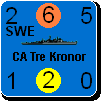Shannon V. OKeets
Posts: 22095
Joined: 5/19/2005
From: Honolulu, Hawaii
Status: offline

|
Someone was commenting on the oil rules being complex. Here are the MWIF writeups on the 2 optional rules primarily concerned with oil.
=============================
27.1 Oil Rules
This optional rule simulates the important role that oil played during WW II. Be warned
that adding this rule increases the complexity of the game quite a bit. The mechanics are much
easier with the program doing the record keeping (than doing them by hand when playing over
the board) but the more dramatic increase in complexity is due to the impact the oil rules have on
tactical, operational, and even strategic planning, and execution of those plans. In practical
terms, the oil rules change how units are reorganized, from disorganized to organized, with some
unit types requiring oil resources.
Disorganized units that are not oil dependent are reorganized to organized
during the final reorganization step. Those that are oil dependent have additional restrictions
placed upon whether they can be reorganized at that time. Specifically, during the final
reorganization step oil resources must be spent to reorganize oil dependent units.
All naval and air units are oil dependent and it costs 0.2 or 0.1 oil points to reorganize
each unit, depending on unit type and which optional rules are in effect. Land based units are
only oil dependent if they are motorized, mechanized, or armor. In general, corps/army sized
units cost 0.2 oil points to reorganize and divisions cost 0.1. Notable exceptions are HQ units
with HQ-I costing 0.4 and HQ-A costing 0.6 oil points. If you have a question about any specific
unit, the oil point cost to reorganize it is part of the general information displayed for each unit,
along with the build points needed for building it and the time it takes for the unit to be built.
For a unit to use oil for reorganizing, the oil must belong to the unit's controlling major
power. Even oil controlled by co-operating major powers can't be used. However, Communist
and Nationalist Chinese can use each other's oil. Chinese controlled oil resources may reorganize
disorganized US units in China if they can trace a supply path (of unlimited length) back to
Stilwell. You do not have to transport the oil anywhere. But you must be able to trace a path
from the unit to the oil resource. This path is exactly like a basic supply path (including via
overseas) except that it can be of any length.
The total oil needed for all the units you choose to reorganize, rounded to the nearest
whole number, is the minimum amount of oil resources (whether from the current turn or saved)
that you must spend. This means that you can reorganize 2 units that cost 0.2 oil points each for
free (because 0.4 rounds to zero). However, if units costing a total of 0.5 or more oil points to
reorganize trace a path to the same oil resource, you must spend that resource. This may mean
that you will have to spend more oil resources than the minimum amount.
For example, assume you have only 2 oil resources and 6 oil dependent units to
reorganize (at 0.2 oil points per unit). You will have to spend at least a minimum of 1 oil
resource because 6 * 0.2 = 1.2, which rounds to 1. And you will only have to spend that
minimum if 4 or 5 of the units can trace a path to the same resource. But suppose that 3 units can
only trace to 1 of the oil resources and the other 3 can only trace to the second oil resource. In
that case, you would have to spend both resources to reorganize all 6 units.
If a supply unit was expended to make an HQ a primary supply source during the turn,
then during final reorganization, that HQ may reorganize oil dependent units (even itself) as if it
were 1 oil resource.
When sending resources to another player, you must also commit how many of the
resources are oil.
27.2 Saving Oil Resources & Build Points
This optional rule lets a player save build points and oil resources (i.e., oil points). It
should probably be used whenever the optional rule for oil is being used. With this rule in effect,
a player does not have to depend on fresh oil every turn for reorganizing his troops. Instead, he
can use the old stuff from previous turns. It also lets the player save oil resources and build
points for production in later turns, essentially retaining excess production as inventory against a
future date when it might be more useful.
A player can save oil resources and build points from turn to turn. To save an oil
resource it must have neither been used in production nor for reorganizing units. The process is
fairly easy, you transport an oil resource to a city or a port that you control and simply indicate
that you are saving it. There is a limit on how much oil can be held in one hex: 4 for a city, 4 for
a port, and double if it's a major power's capital. For example, London can store 16 oil points =
(4 for the city + 4 for the port) * 2 for being a major power's capital. You can't save non-oil
resources. Neutral major powers can only save one oil per turn (in addition to any previously
saved oil).
You save build points the same way as saving oil resources with the same constraints on
number per hex. You can save both oil points and build points in the same hex (e.g., 16 of each
in London).
Once you have saved oil resources you can use them exactly like any other oil resource:
either to reorganize units or as resources for production. You can also transport saved build and
oil points like any other resource, with the additional flexibility that they may be transported to
cities and ports that are not factories. Of course, an oil resource still has to get to a factory to be
used for production.
In a later production step, you can remove saved build points from the map and add them
to your build point total. You may spend any number saved at your capital but no more than 1
saved build point may be consumed per turn from each other city, useable factory and port. For
example, you can spend 4 saved build points in Hamburg (1 for the city + 1 for the port + 2 for
the factories), and an unlimited number in Berlin each turn.
If one of your land units enters a hex containing saved enemy oil resources (or saved
enemy build points), they become your oil resources (or build points). Saved build points and
saved oil resources can also be destroyed by strategic bombardment .
When you are using the optional rule for Factory Destruction and Construction, the
strategic bombardment bonus for bombers that fly to their target uncontested (no enemy fighters)
changes. Normally the bonus is a flat +1. When the optional rules for (a) Factory Destruction
and Construction and (b) Saving Oil Resources are both in effect, the addition is 0.1 times the
number of factories, oil resources, synthetic oil plants (if that optional rule is being used), saved
oil, and saved build points in the hex. Any fraction is converted to the next whole number. For
example, 3 factories + 3 saved oil + 5 saved build points gives a +2 bonus to the strategic
bombers (1.1 rounds up to 2).
_____________________________
Steve
Perfection is an elusive goal.
|
 Printable Version
Printable Version
 )
)













 New Messages
New Messages No New Messages
No New Messages Hot Topic w/ New Messages
Hot Topic w/ New Messages Hot Topic w/o New Messages
Hot Topic w/o New Messages Locked w/ New Messages
Locked w/ New Messages Locked w/o New Messages
Locked w/o New Messages Post New Thread
Post New Thread